Australian building codes are set for a shake-up with new provisions for climate resilience and carbon-footprint reporting to be considered.
Federal, state and territory building ministers have agreed to add climate resilience as an objective of the Australian Building Codes Board (ABCB).
Federal Industry Minister Ed Husic said the agreement paved the way for the ABCB to consider future standards which would ensure buildings could better withstand more extreme weather.
“This will mean fewer Australians and communities displaced by natural disasters, lower rebuilding costs, quicker recovery and more builders and tradespeople available to build the new homes,” Minister Husic said.
He said the ABCB would work with industry, government and community stakeholders to ensure any future National Construction Code changes to improve climate resilience were cost effective, practical and fit-for-purpose.
Minister Husic said ways to report the carbon footprint in construction – including extraction, production, transport and manufacturing of building materials – were also being addressed.
“Ministers agreed to include a voluntary pathway for commercial buildings to calculate and report on embodied carbon in the 2025 National Construction Code, with the Australian Building Codes Board tasked to investigate how to incorporate a future minimum standard in the NCC 2028.”








